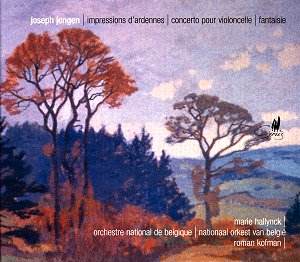In the year of the 50th anniversary of his death Jongen's
output is being reassessed. People know his name because of his music
for solo organ and for the multiply recorded Symphonie Concertante
for organ and orchestra. Well, it's a start anyway!
Impressions d'Ardennes is in a single
movement. You might have been expecting something like Massenet's or
Gustave Charpentier's 'scènes' suites; not a bit of it. Instead
this is a late romantic topographical rhapsody. It conjures the spirit
of the region rather than being a stringing together of picture postcards
or folk material. The Belgian National Orchestra are not specially plush
in the string department but everything else is cleanly put across in
a score that touches on the confident grandeur of the high and lonely
places. Parallel works would include Novak's In the Tatras, d'Indy's
Jour d'été and Delius's Song of the High Hills.
This is lightened by folksy voices similar in style to Vaughan Williams'
Norfolk Rhapsodies and In the Fen Country.
The Impressions along with the Southey-based
orchestral fantasy Lalla-Rookh (a fascination with mid-Eastern
exotica also shared with fellow countryman Adolphe Biarent) were published
by Chester in London as late as 1931. The English connection is accounted
for by the fact that during the Great War Jongen fled to England, returning
shortly after the war had ended. Links between the two countries should
not be surprising. Channel ferries were regular. Indeed in the early
years of the century Granville Bantock promoted concerts in Belgium
mixing his own works and those of Holbrooke and Belgian composers.
Jongen wrote his Cello Concerto for the virtuoso
Jean Gérardy - that ‘Thibaud of the cello' said Le monde Musical
in Paris. It was written in 1900 - the same year as the Jongen Symphony.
A placid soulful assez lent, which towards its end develops a
pert trilling charm, divides the first and third movements. The outer
movements at times pick up on the world of Bruch, Tchaikovsky and Saint-Säens.
Marie Hallynck is a spirited interpreter playing with admirably vibrant
and burred tone on a 1717 Matteo Gofriller.
The concerto was premiered by the dedicatee at the
Concerts Ysaÿe on 15 May 1904 conducted by Ysaÿe himself.
In the second half of that concert Ysaÿe conducted the Brussels
premiere of d'Indy's Second Symphony.
The Fantaisie is placed by Cyprès's
Michel Stockhem in the Belgian's d'Indyist camp. This he links back
to Guillaume Lekeu's Fantaisie sur deux airs populaires angevin.
The strings sound much smoother here than in the other two works. The
music proceeds as if driven by instinct. The jaunty moments, often carried
by the brass, disconcertingly remind one of Brahms' Haydn Variations
or Academic Festival (5.51). There are many charming coups
including at 5.12 the modest solo trumpet line as well as some Tchaikovskian
high jinks at 6.03.
Once again Cyprès have done a sterling job kicking
over the predictable traces - choosing repertoire, orchestra and conductor
well. Documentation is all you could ask for. Good to see Roman Kofman's
name again. Last time I encountered him was when reviewing Valentin
Silvestrov's surreal-melodic Fifth Symphony (BMG-Melodiya). He is the
dedicatee of that work and conducted that premiere recording. Kofman
shows himself just at ease in high-romantic seas as in the late Twentieth
Century modernists.
Rob Barnett
